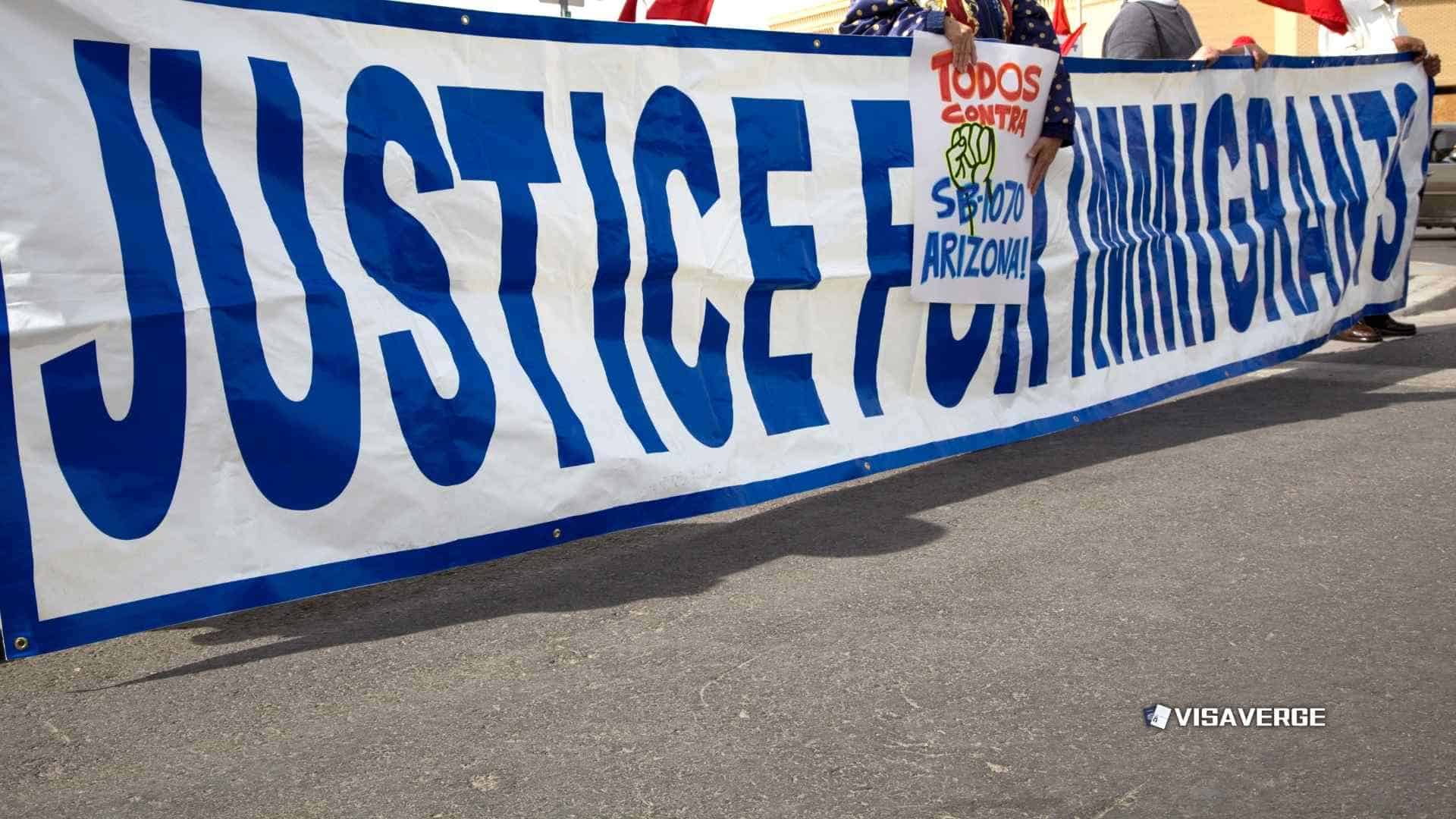Key Takeaways
• Idaho’s House Bill 135 restricts undocumented immigrants’ access to non-emergency state-funded services starting July 1, 2025.
• ACLU of Idaho filed a lawsuit arguing the law is vague, unconstitutional, and harms HIV-positive patients and children.
• The law requires proof of lawful US residency for benefits; emergency medical care remains available to all.
On June 26, 2025, the ACLU of Idaho filed a federal lawsuit challenging a new Idaho law that restricts access to public benefits for undocumented immigrants. The law, known as House Bill 135, is set to take effect on July 1, 2025. Signed by Governor Brad Little in April, this law marks a significant shift in Idaho’s approach to public health and social services for undocumented immigrants. The legal challenge, brought by the ACLU of Idaho on behalf of a doctor and four HIV-positive immigrants, raises urgent questions about public health, legal rights, and the responsibilities of healthcare providers across the state.
What Does the New Idaho Law Do?

House Bill 135, the new Idaho law, restricts access to non-emergency state-funded services for undocumented immigrants. This means that anyone who cannot prove they are lawfully present in the United States 🇺🇸 will be denied access to a range of public benefits. These include:
- State-funded vaccines
- Testing for communicable diseases
- Prenatal and postnatal care
- Crisis counseling
- Some food assistance programs for children, such as WIC (Women, Infants, and Children)
Emergency medical care is not affected by the law, so hospitals and clinics must still provide treatment in life-threatening situations, regardless of a person’s immigration status. However, many other services that help keep communities healthy and safe are now off-limits to undocumented immigrants.
Who Is Affected and How?
Idaho is home to an estimated 35,000 undocumented immigrants. Many of these individuals work, pay taxes, and have lived in the state for years. The new law will impact:
- HIV-positive patients: Dozens of people who rely on the federal Ryan White HIV/AIDS Program for life-saving medication could lose access if they cannot prove lawful presence.
- Children and families: Kids who depend on state-funded vaccines or food assistance may be denied these benefits if their parents cannot provide the required documents.
- Healthcare providers: Doctors, nurses, and clinic staff must now check immigration documents before giving certain services, adding confusion and paperwork to their daily work.
The ACLU of Idaho argues that the law is vague and makes it nearly impossible for healthcare providers to know what documents are acceptable. This uncertainty could lead to people being wrongly denied care or benefits.
Why Did Idaho Pass This Law?
Supporters of House Bill 135, including several state senators, say the law is needed to protect taxpayer dollars and align Idaho with federal immigration priorities. They argue that public benefits should only go to people who are lawfully present in the United States 🇺🇸. According to Sen. Todd Lakey and other backers, the law ensures that state resources are used as intended and helps enforce immigration laws.
However, critics—including some lawmakers, public health experts, and immigrant advocates—warn that the law could have serious unintended consequences. They say it puts vulnerable people at risk, especially children and those with chronic health conditions like HIV. Sen. Jim Guthrie and Sen. Melissa Wintrow have both spoken out about the dangers to public health and child welfare.
How Will the Law Be Enforced?
Starting July 1, 2025, anyone applying for non-emergency state-funded benefits in Idaho must show proof of lawful U.S. residency. Acceptable documents may include:
- A state-issued ID or driver’s license
- A U.S. passport
- Other federally recognized documents
Healthcare and social service providers are responsible for checking these documents before giving out benefits. If a person cannot prove their status, they will be denied access to the service. There is no clear guidance on what to do if someone’s documents are unclear or missing, which has caused concern among providers.
The Lawsuit: Who Is Challenging the Law and Why?
The ACLU of Idaho filed the lawsuit on behalf of Dr. Abby Davids, a physician who treats HIV-positive patients, and four anonymous plaintiffs living with HIV. The group includes:
- A married couple from Colombia with pending asylum applications
- A DACA (Deferred Action for Childhood Arrivals) recipient
- A long-term Idaho resident from Mexico
The lawsuit argues that the Idaho law is unconstitutional, conflicts with federal law, and is so vague that it is impossible for providers to follow. The plaintiffs are seeking class-action status, which would extend any court ruling to all affected individuals in Idaho.
According to analysis by VisaVerge.com, the legal challenge could have far-reaching effects, not only for Idaho but also for other states considering similar laws.
Public Health Concerns
One of the biggest worries about the new Idaho law is its impact on public health. By restricting access to vaccines, disease testing, and HIV medication, the law could make it harder to control the spread of infectious diseases. Public health experts warn that:
- Untreated HIV: People who lose access to HIV medication are more likely to get sick and can more easily spread the virus to others.
- Vaccine gaps: Children and adults who cannot get vaccines may be at higher risk for diseases like measles, mumps, and whooping cough.
- Community risk: When some people in a community cannot get care, everyone’s health is at risk.
The Idaho Division of Public Health has clarified that HIV is not considered an emergency condition under the law, so patients who need ongoing medication may be denied help if they cannot prove their status.
Impact on Children and Families
The law could also hurt children and families. Many kids rely on programs like WIC for healthy food or on state-funded vaccines to attend school. If their parents cannot provide the right documents, these children may go without basic needs. Opponents of the law say this is unfair and could lead to more hunger and illness among Idaho’s youngest residents.
Administrative Burden for Providers
Healthcare providers and social service workers are now on the front lines of enforcing the law. They must check documents, decide if they are valid, and keep records. This adds to their workload and may create confusion, especially if there is no clear list of acceptable documents.
Some providers worry that they could face legal trouble if they make a mistake. Others fear that people will stop coming to clinics or asking for help because they are afraid of being reported or denied care.
Legal Risks and Federal Law
There are also questions about whether the Idaho law conflicts with federal law. Since 1996, federal rules have generally barred undocumented immigrants from most taxpayer-funded benefits, but there are exceptions for emergency medical care and some public health services. Legal scholars say that Idaho’s law may go too far by restricting services that federal law allows.
If the court finds that the Idaho law is in conflict with federal law, it could be blocked or overturned. This would have implications for other states that might try to pass similar laws.
Multiple Perspectives: What Stakeholders Are Saying
The debate over the Idaho law has drawn strong opinions from many groups:
- ACLU of Idaho: Calls the law an “intentional and cruel attack on immigrant communities” and is fighting to block its enforcement.
- State officials: Defend the law as a way to protect taxpayer dollars and uphold the rule of law.
- Healthcare providers: Worry about losing the ability to care for vulnerable patients and the extra burden of checking documents.
- Immigrant communities: Fear losing access to essential services and facing more stigma and discrimination.
- Public health experts: Warn that the law could lead to more disease outbreaks and harm the entire community.
- Legislative opponents: Argue that the law will hurt children and families and undermine public health.
Background: How Did We Get Here?
Idaho’s new law is part of a larger trend of states taking a tougher stance on undocumented immigrants. In the 1990s, the federal government passed laws that limited access to public benefits for undocumented immigrants, but left some room for emergency and public health services. Under the Trump administration, federal agencies were told to tighten eligibility checks, and some states followed suit.
Idaho has passed other laws targeting undocumented immigrants in recent years. For example, HB 83 (2025) created new state immigration crimes, but parts of that law have been blocked by a federal judge while the courts decide if it is legal.
What Happens Next?
The ACLU of Idaho is asking the court for a preliminary injunction, which would stop the law from taking effect on July 1, 2025, while the lawsuit moves forward. If the court grants the injunction, the law’s implementation could be delayed or blocked statewide. If not, thousands of people could lose access to critical services as soon as the law takes effect.
The outcome of the lawsuit could set a precedent for other states. If the court rules that Idaho’s law is legal, other states may pass similar laws. If the court blocks the law, it could limit how far states can go in restricting benefits for undocumented immigrants.
Practical Steps for Affected Individuals
If you or someone you know may be affected by the new Idaho law, here are some steps to consider:
- Gather documents: Collect any proof of lawful U.S. residency, such as a state ID, driver’s license, or U.S. passport.
- Contact providers: Ask your healthcare provider or social service agency what documents they will require starting July 1, 2025.
- Seek legal help: If you are denied benefits or have questions about your rights, contact the ACLU of Idaho or another legal aid organization. You can find more information and resources on the ACLU of Idaho website.
- Stay informed: Follow updates from the Idaho Division of Public Health and the Idaho Legislature for the latest news on the law and the lawsuit.
Where to Find Official Information
- For the full text of House Bill 135 and related bills, visit the Idaho Legislature’s official website.
- For guidance on public health services and provider responsibilities, contact the Idaho Division of Public Health.
- For legal assistance or to join the lawsuit, visit the ACLU of Idaho website.
Conclusion: A Turning Point for Idaho and Beyond
Idaho’s new law restricting benefits for undocumented immigrants is more than just a local issue. It is a test case for how far states can go in limiting access to public health and social services. The outcome of the ACLU of Idaho’s lawsuit will shape the lives of thousands of people in Idaho and could influence laws in other states.
As reported by VisaVerge.com, the legal and public health stakes are high. The law’s supporters say it is about protecting resources and enforcing the law. Opponents warn that it will hurt vulnerable people, increase disease risk, and create confusion for providers. With the law set to take effect on July 1, 2025, all eyes are on the federal court to see what happens next.
For now, Idaho’s undocumented immigrants, healthcare providers, and advocates are bracing for major changes—and hoping that the courts will provide clear answers soon.
Learn Today
House Bill 135 → A 2025 Idaho law restricting state-funded non-emergency services to undocumented immigrants.
Undocumented immigrants → People in the US without legal authorization or valid immigration status.
Ryan White HIV/AIDS Program → Federal program providing HIV medications and care to eligible patients.
Class-action lawsuit → A legal case where a group represents many affected individuals collectively.
Emergency medical care → Urgent or life-saving healthcare services provided regardless of immigration status.
This Article in a Nutshell
Idaho’s HB 135 limits public benefits for undocumented immigrants starting July 2025, excluding emergency care. The ACLU challenges this law, citing public health risks, especially for HIV-positive patients and children relying on vaccines and food assistance programs across the state.
— By VisaVerge.com







